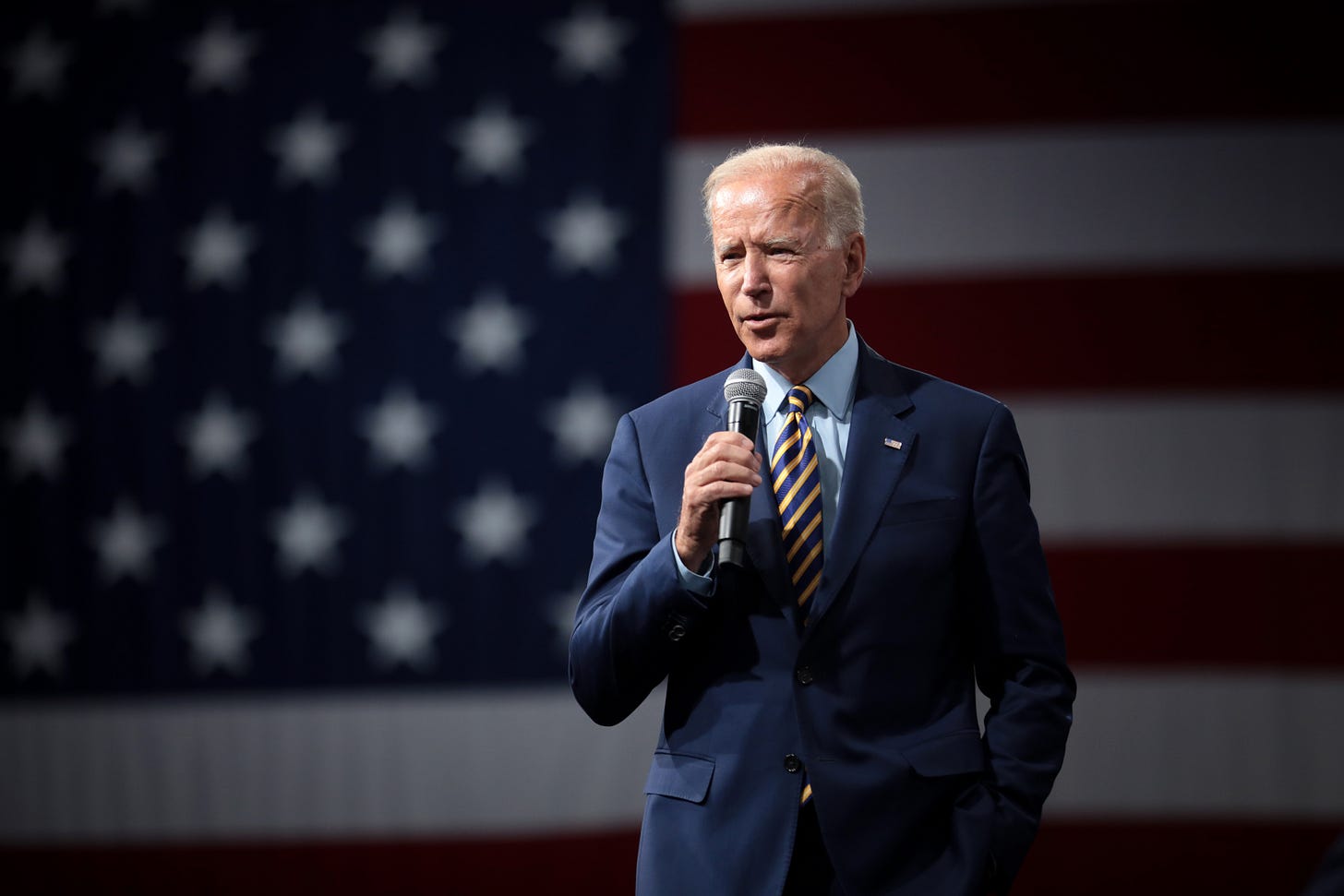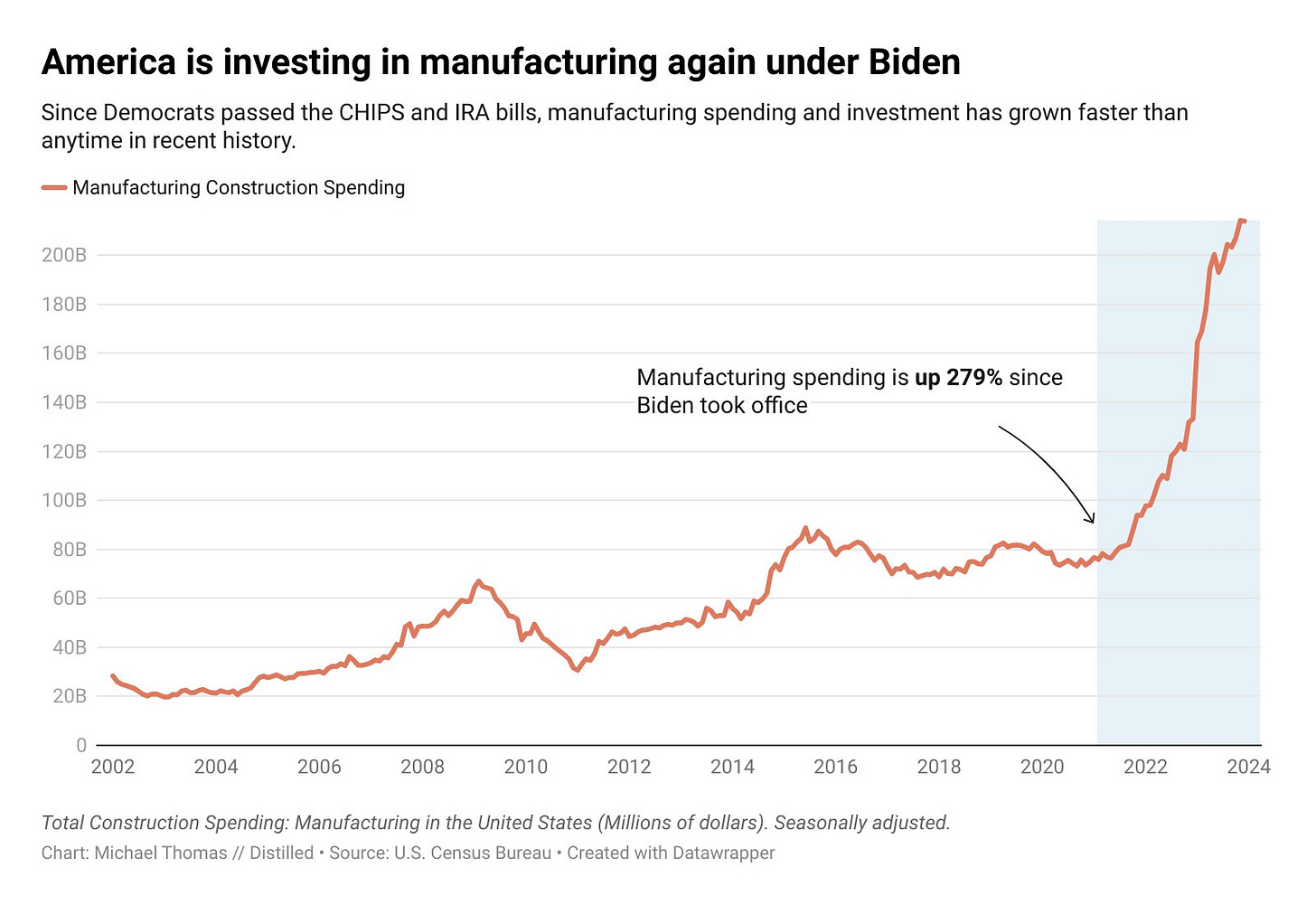What Americans Need to Hear About Biden's Climate Record
Biden has done more to fight climate change than any president. But most people don't know that.
In 8 months, Americans will cast their ballots and choose the next President. Few, if any, events this year will have more consequences for both the country and the world’s climate progress.
If Americans elect Biden, the United States could very likely reach the emissions targets outlined in the Paris Agreement. If Trump is elected, the country is likely to emit 50% more greenhouse gasses by 2030, a difference of more than a billion tons of emissions per year, according to projections released by Carbon Brief this week.
That’s a wonky way of saying what many readers of this newsletter will already intuit: If Trump wins in 2024, America’s climate progress will come to a screeching halt, the effects of which will ripple around the world. If Biden wins, the climate progress of the last three years will continue.
But here’s the problem: Most Americans aren’t hearing that. Instead, they are being distracted by an absurd debate over whether Biden, who is 81, is too old compared to Trump who is 77. They are reading newspapers that cover elections as if they are horse races written by pundits who cover the latest poll data more than policy outcomes.
That’s why climate and environmental advocates need to start communicating what the difference between a Biden and Trump presidency would mean for our country and the planet. And we need to start doing it now.
A tale of two presidencies
We live in a moment of intense political apathy. Many Americans see little difference between the Democratic and Republican parties and their candidates. But the climate records and 2024 proposals of Biden and Trump couldn’t be more different.
Trump famously thinks that climate change is a hoax. He’s said that if he’s elected he will gut the regulatory agencies in charge of preventing big companies from polluting our air, rivers, and public lands.
Trump has said that he plans to roll back the Inflation Reduction Act—Biden’s signature climate bill. If successful, the growth of renewable energy, electric vehicles, and nascent technologies like green hydrogen would come to a screeching halt at a time when we need them to grow exponentially.
In campaign speeches, Trump has promised to “Drill, baby, drill,” and sell off America’s public lands to oil and gas companies. On this point, some climate activists might ask how that would be any different than what Biden has done. After all, Biden approved the Willow Project and was forced by conservative judges to lease land to oil and gas companies despite his campaign pledge not to.
Here, too, we need to set the record straight and communicate the difference between Trump and Biden.
Biden has leased far less public land to oil and gas companies than any President in modern history. In the first two years of his presidency, Trump leased 2.4 million acres for oil and gas production. By comparison, Biden’s administration leased 324,000 acres in its first two years. In other words, Trump leased 7 times more land to oil and gas companies than Biden.
Trump cleared the way for companies to build pipelines like the Keystone XL project and drill in Alaska’s Arctic National Wildlife Refuge. When Biden took office, he killed the Keystone XL project and blocked drilling permits in the Arctic National Wildlife Refuge.
For anyone who sees climate change as an existential threat or cares about the environment, there’s a lot to fear in a Trump presidency. But there’s also a lot to hope for in a Biden re-election.
In his first term, Joe Biden has done more to address climate change than any President before him. The Inflation Reduction Act (IRA) alone is expected to wipe out 21 billion tons of planet-warming pollution between now and 2050. For comparison, that’s 73 times more emissions than the infamous Willow Project will emit over the same period. It’s like canceling out the emissions from the entire country of India for a decade.
The IRA is also spurring a clean energy revolution. Solar and wind are on track to produce more electricity than coal this year for the first time. Electric vehicles’ market share is up by roughly 400% since Biden took office. (For my EV-skeptical, public transit-loving friends, it’s worth noting that the IRA invested more money—$25 billion—in public transit than any bill in U.S. history).
All of this has been good for America’s economy too.
Trump talked a lot about bringing manufacturing back to America and creating blue-collar jobs. But under Biden, manufacturing investment has grown faster than at any time in recent history thanks largely to the IRA. During Trump's presidency, manufacturing spending grew by 5%. Under Biden, it has grown by 279%.
After years of stagnant growth in innovation and technological progress in America, companies are finally investing in the country’s future again. Research and development spending as a share of GDP is currently at 3.5%, higher than at any time in at least a century.
The macroeconomic data in America hasn’t looked this good in a long time. Unemployment is lower than its been in 54 years. Real wages—that is incomes after accounting for inflation—are rising. Wage inequality is falling for the first time in decades. No advanced large economy is growing faster than the United States right now.
And all of this is happening while carbon emissions are decreasing.
Biden deserves credit for his climate record
Four years ago, if Biden had promised to do everything that he’s done during his first term, most pundits would have laughed him out of the room. Even after winning the 2020 election, passing any climate policy seemed unlikely. The Senate was split 50-50 and Joe Manchin—a literal coal baron—was the swing vote.
Yet, the last four years unfolded in completely unexpected ways.
For decades, environmental advocates have tried to convince lawmakers to pass even the most marginal climate policies. And they’ve failed. It wasn’t until Biden took office that the logjam broke and the climate policies flowed. Since then, America has experienced remarkable progress.
And that’s a story that Americans deserve to hear. It’s a story we should all be telling more often.





Doing more for climate change? Some people define words differently, just saying.